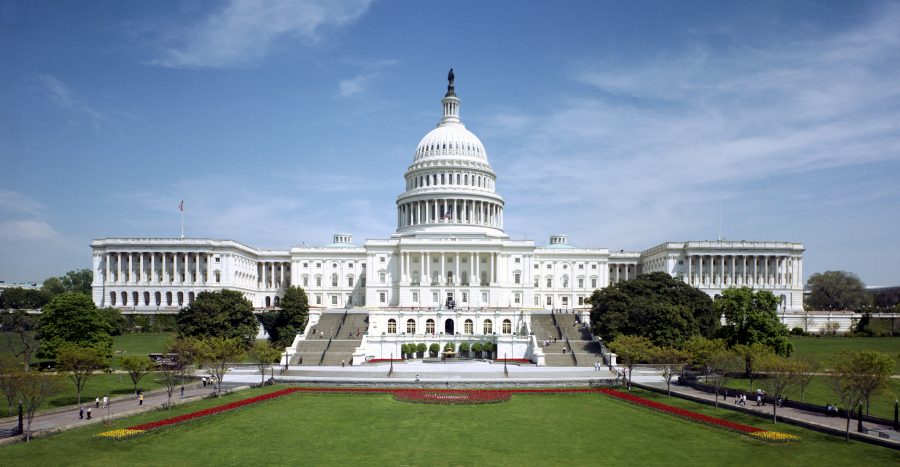The New Green Deal is a hot topic for Congressmen and the public
A divided America will never be able to create a solution for climate change if compromise and respect are not the main focus in negotiations.
Politicians should be actively seeking tranquil, ambitious dialogue between both sides to productively take steps toward progress.
On Thursday, Feb. 7, New York Rep. Alexandria Ocasio-Cortez announced a plan that she and Massachusetts Sen. Edward Markey are leading which proposes to revamp the U.S. economy and utterly transform the way we extract and expend energy.
The “Green New Deal” is already being called a socialist expenditure by Republicans, who say that the proposal will cripple Americans into deeper reliance on the government, according to the New York Times.
Ocasio-Cortez herself has stated that the purpose of the plan is to refocus the entire nation’s economy and welfare system, and to prepare America to move completely away from fossil fuels, turning exclusively to clean energy by 2030.
Already, major national news sources are choosing sides in this proposal, either supporting it completely or ignoring any legitimacy the proposal might have.
Faced with fierce partisanship from politicians and the media alike, how should Americans respond?
The Green New Deal is not without flaws, to say otherwise is foolish. In its current form, the plan remains too dubious for its logistics to be understood and implemented, but remains useful for its ability to shed light on these worthwhile issues.
The plan proposes “a family-sustaining wage, retirement security, high-quality education, clean air and water, healthy food, high-quality health care, safe, affordable, adequate housing, economic security for all who are unable or unwilling to work.”
Though these sound like good ideas, the plan fails to answer the question: who will pay for these new benefits?
Estimates on the actual cost of the plan have not been specified by its sponsors, and Ocasio-Cortez herself has declined to clarify, but many have said that it would cost trillions. Whatever the actual cost, the tremendous scope of the Green New Deal is daunting, even for a country as large as the United States.
Yet slamming the plan as a “socialist wish list,” as said by Republican National Committee Chairwoman Ronna McDaniel, that will “put 1 million Americans out of work,” also does not productively contribute to the conversation.
Some sources in the media do provide a bipartisan summary of the legislation, rounding out a more balanced depiction of the Green New Deal.
A more neutral explanation by CBS News describes the Green New Deal as “broad and light on specifics, and seen more as a roadmap for overhauling the economy than a concrete piece of legislation.”
An article on Bloomberg.com, states that “the Green New Deal would retrofit all American buildings and factories to be carbon-neutral, electrify all transportation, and switch the entire electrical grid to carbon-neutral energy sources.”
These are exceptions to the norm of partisanship, still backlash is fierce from Republicans and right-wing news stations. “In order to have a dream that big, you gotta be on drugs,” said Peter Morici on Fox News. It would seem that the right media would more often choose to laugh at the Green New Deal, than they would attempt to debate and revise the plan.
Conversely, left-wing supporters love the Green New Deal for its radical zeal and fast-paced timeline, though Speaker of the House Nancy Pelosi even questioned the plan and withheld total support beyond saying, “we welcome the enthusiasm that is there.”
Ocasio-Cortez herself has responded to criticism saying, “It’s not just some fringe idea. Nearly every 2020 Democrat supports it.”
This statement does not dispel questions that myself and others have regarding the Green New Deal. Within the conflict from both sides remains the question: is this proposal actually practical?
Unfortunately, it’s hard to know the answer because it seems that Democrats and Republicans are unable to facilitate civil debate.
If we all want to continue to enjoy the splendor and abundance of this country, we need to make changes within our economy that will help the planet thrive. This does not necessarily mean that the Green New Deal is the only solution we should proceed with going forward.
The Green New Deal sounds impractical due to the lack of specifics and logistical planning. But it still does contain nuggets of necessary radical change that need to be implemented to repair global economies, and rewrite the catastrophic effects of climate change.
Both parties should be actively involved in the process of revision for all environmental and economic plans brought forward. We don’t have time to only argue along party lines, someone needs to step up to the legislative process and work cohesively until a practical formula is set into motion.
Cleaning up the planet should be on the hearts of all politicians. Our leaders ought to be so invested in the prosperity of America and our natural resources that they tirelessly work in unison to find a solution.
The Green New Deal is not the ultimate solution to climate change, but it is valuable for the purpose of opening the door for politicians to have conversations in a manner than approaches these issues with intentional commitment and action.

















































































